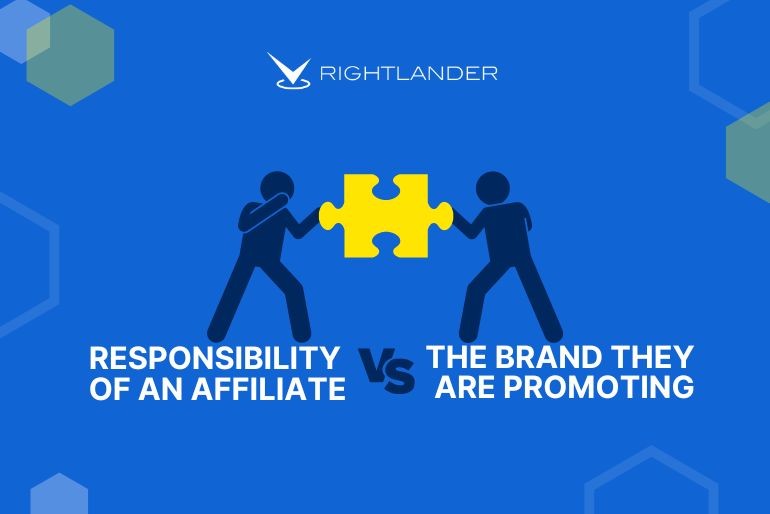In the fast-paced realm of digital marketing, strict regulation is vital amid numerous partnerships and affiliate programs. Brokers and promoters must balance compliance with maximising promotions and navigating a complex landscape of responsibilities. While compliance might seem like a barrier to some, it's crucial to emphasise that it is a facilitator, enabling businesses to manage consumer expectations effectively and build trust within their target audience.
Understanding the Distinctions: Marketing Partners vs. Affiliates
First of all, clarifying the distinction between marketing partners and affiliates is essential. Marketing partners often encompass various collaborations, including agencies, influencers, and strategic alliances. They typically have a more direct relationship with the brand and are involved in marketing strategies and campaigns more deeply. On the other hand, affiliates are individuals or entities who promote products or services for a commission. They operate independently, leveraging various marketing channels to drive traffic and conversions.
Key Responsibilities for Marketing Partners:
Marketing partners shoulder significant responsibilities in ensuring compliance and maintaining brand integrity:
- Adherence to Brand Guidelines: Marketing partners must align their strategies with the brand's values and guidelines to maintain consistency across all promotional materials.
- Risk Management: Partners must assess and mitigate risks of promoting financial products or services. This involves understanding the potential legal, reputational, and financial risks and taking appropriate measures to minimise them.
- Consumer Protection: Advertising partners prioritise consumers' interests by providing accurate and transparent information about financial products or services. This includes educating consumers about potential risks and ensuring they make informed decisions.
Affiliates play a crucial role in amplifying brand visibility and driving conversions, with responsibilities including:
- Ethical Promotion: Affiliates must promote products or services honestly and transparently, avoiding misleading claims or deceptive practices.
- Compliance with Terms of Service: Adhering to the terms and conditions set by the affiliate program, including guidelines on content usage, tracking mechanisms, and commission structures.
- Quality Traffic Generation: Focusing on driving quality traffic that is more likely to convert rather than merely maximising clicks or impressions.
- Data Protection and Privacy: Respecting user privacy and handling customer data responsibly in accordance with data protection laws.
Throughout the past two years, Rightlander scans have highlighted the crucial need for vigilance in marketing practices. A prominent trading affiliate enticed readers with promises of earning thousands from a mere $10 deposit while endorsing reputable financial brands. However, this page failed to include necessary risk warnings, thereby breaching multiple CAP codes aimed at maintaining marketing integrity.
Almost 8,600 adverts on Instagram, YouTube and Facebook, promising quick and easy profits and guaranteed returns, were blocked or scrutinised by the UK financial watchdog in 2022.
In 2023, the Financial Conduct Authority (FCA) prompted the withdrawal or modification of over 10,000 financial advertisements and other promotional materials, a 17% increase compared to the previous year.
The FCA issued 2,285 alerts to safeguard consumers against fraudulent schemes, a notable increase from the 1,800 alerts published in 2022. This reflects heightened regulatory scrutiny and the imperative for greater compliance within the industry.
Benefits of Automated Tools for Marketing Compliance
In the pursuit of regulatory compliance, automated tools offer significant advantages for both brands and their marketing partners:
- Efficiency and Accuracy: Automated compliance tools streamline the monitoring process of marketing activities, promptly flagging any potential violations. This reduces the burden of manual oversight and ensures greater accuracy in compliance efforts.
- Real-time Monitoring: With automated tools, brands can monitor marketing campaigns in real time, enabling swift responses to potential compliance issues.
- Customised Solutions: Many automated compliance platforms offer customisable features tailored to each brand's needs, providing flexibility and scalability as businesses grow.
- Risk Mitigation: Automated tools help mitigate the likelihood of regulatory penalties or damage to brand reputation by proactively identifying and addressing compliance risks.
While the responsibilities of brokers, marketing promoters, and affiliates in ensuring compliance may seem daunting, they are essential for maintaining trust and credibility in the marketplace. By embracing automated compliance solutions, businesses can navigate this landscape more effectively, alleviating manual pressure on their teams while upholding regulatory standards. Compliance should not be viewed as a barrier but rather as a facilitator that enhances consumer trust, fosters brand loyalty, and drives sustainable growth in the competitive digital ecosystem.

 by Shenaly Amin | 10 Sep 2024
by Shenaly Amin | 10 Sep 2024
 3-min read
3-min read




